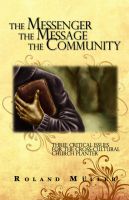 I found David and Norman Geisler’s book, Conversational Evangelism: Connecting with People to Share Jesus while doing some reading on contextualization. I thought it would be interesting combining Norman Geisler’s expertise in apologetics and his son, David’s experience on college campuses and 7 years serving in Singapore. I was not disappointed. This is a very helpful book. Similar in some ways to Randy Newman’s book, Questioning Evangelism: Engaging People’s Hearts the Way Jesus Did, the Geislers’ book has more emphasis on worldviews and apologetics.
I found David and Norman Geisler’s book, Conversational Evangelism: Connecting with People to Share Jesus while doing some reading on contextualization. I thought it would be interesting combining Norman Geisler’s expertise in apologetics and his son, David’s experience on college campuses and 7 years serving in Singapore. I was not disappointed. This is a very helpful book. Similar in some ways to Randy Newman’s book, Questioning Evangelism: Engaging People’s Hearts the Way Jesus Did, the Geislers’ book has more emphasis on worldviews and apologetics.
The first chapter, “The Need for Pre-Evangelism in a Postmodern World”, makes the point that evangelism is a process. Then chapter 2 introduces the model with four types of conversations: “Hearing Conversations, Illuminating Conversations, Uncovering Conversations, and Building Conversations”. The Geislers relate these conversations to four roles we play:
“that of musician, artist, archaeologist, and builder. As a musician, we want to listen more carefully, learn their story, and hear the sour notes people are singing to us … As an artist, we want to paint a picture using questions to help others see themselves in a more true light … As an archaeologist, we want to dig up their history and find the real barriers that are chaining them down … as a builders, we want to build a bridge to the Gospel. (Kindle loc. 675-682)
Recognizing that people are more open to truth that they uncover themselves, the authors advocate the use of questions. They recommend that we ask questions to:
- surface doubt about their own perspective
- minimize their defensiveness
- create in them a curiosity to want to hear more. (Kindle loc. 699)
Chapters 3-6 focus on learning the four roles in the Conversational Evangelism model. Chapter 7 explores the “art of answering objections while moving forward”. Chapter 8 gives insights into the “art of asking questions of people with different worldviews”. Chapter 9 gives suggestions for “countering common misconceptions that affect evangelism”.Following the conclusion that recaps the model and encourages a heart for the lost, there is a helpful list of resources for evangelism and apologetics. There are three helpful appendices for learning and practicing the model.
The book gives examples of the kinds of questions to use in different situations, recognizing that conversational evangelism is more art than science. What stood out to me was that in each conversation we want to keep the door open for further conversations. Gone are the days (if they were ever really here) when the Gospel can be shared in one sitting. We may get the privilege of building on the conversations of other believers and be the one to reap the harvest. Usually it will take several conversations over time for someone to understand and embrace the Gospel.
Evangelism is indeed a process and this book by David and Norman Geisler is a helpful resource that will help sharpen our involvement in this great work.








